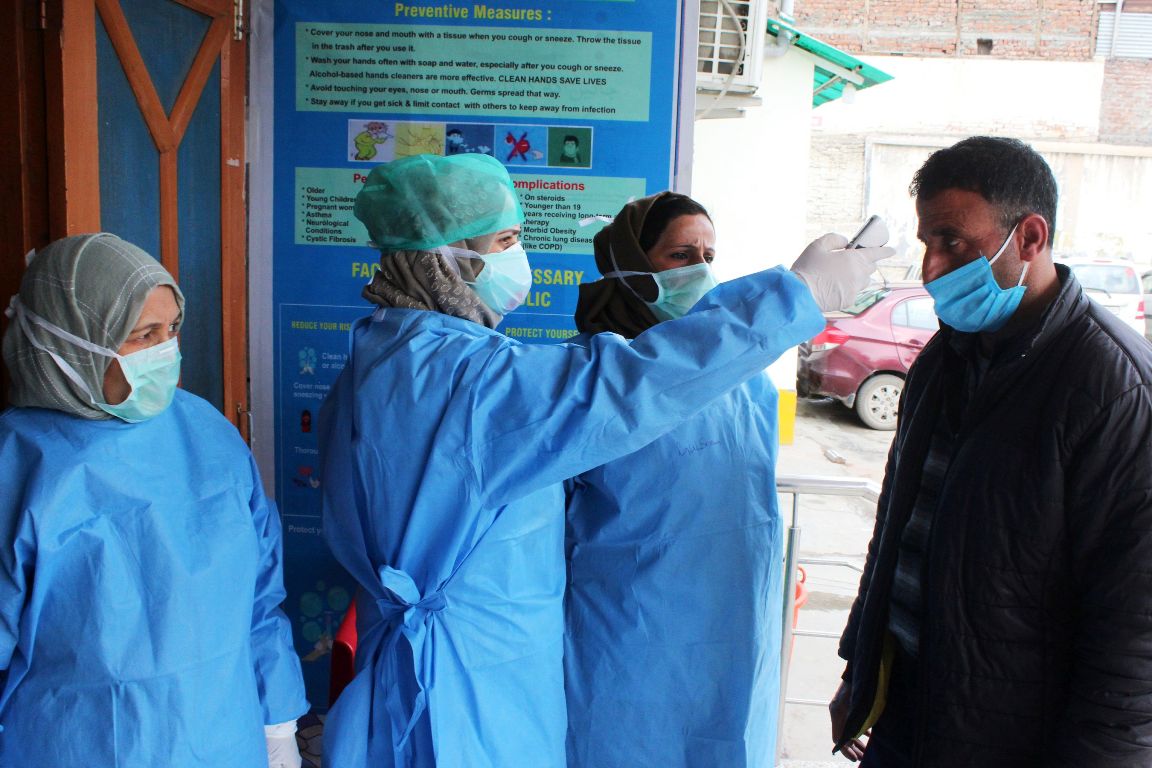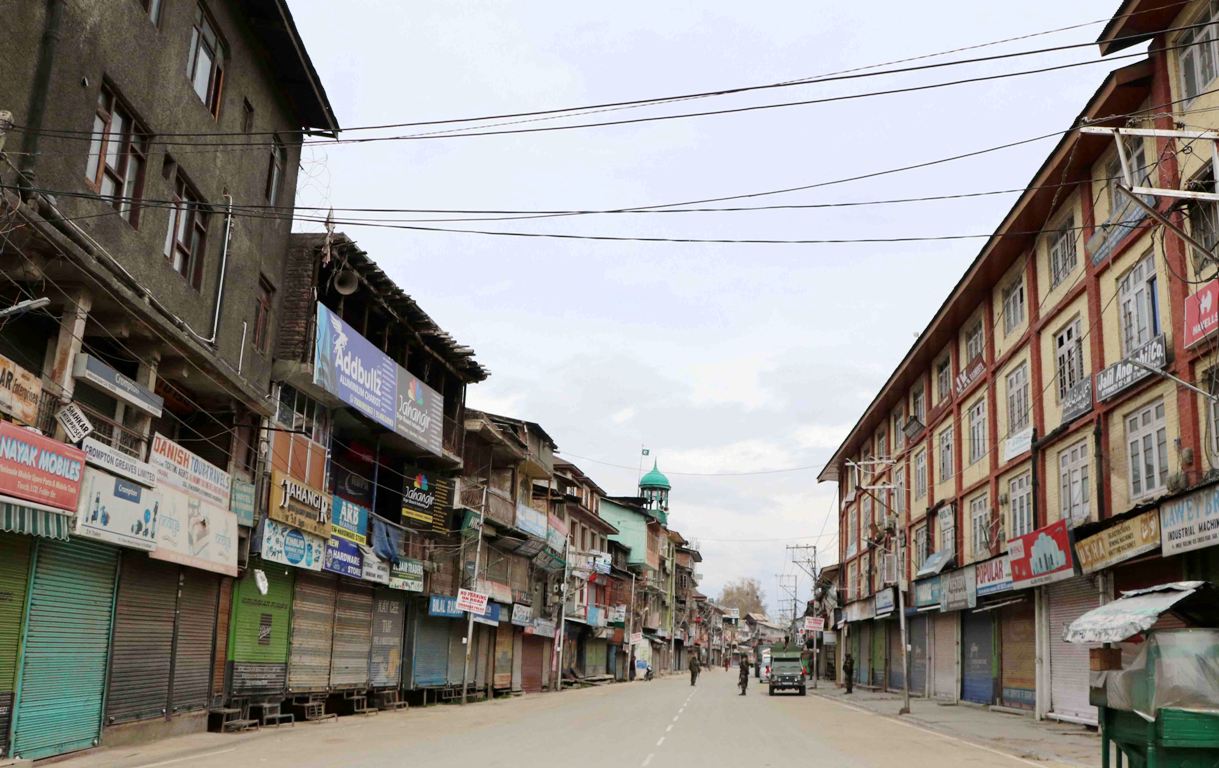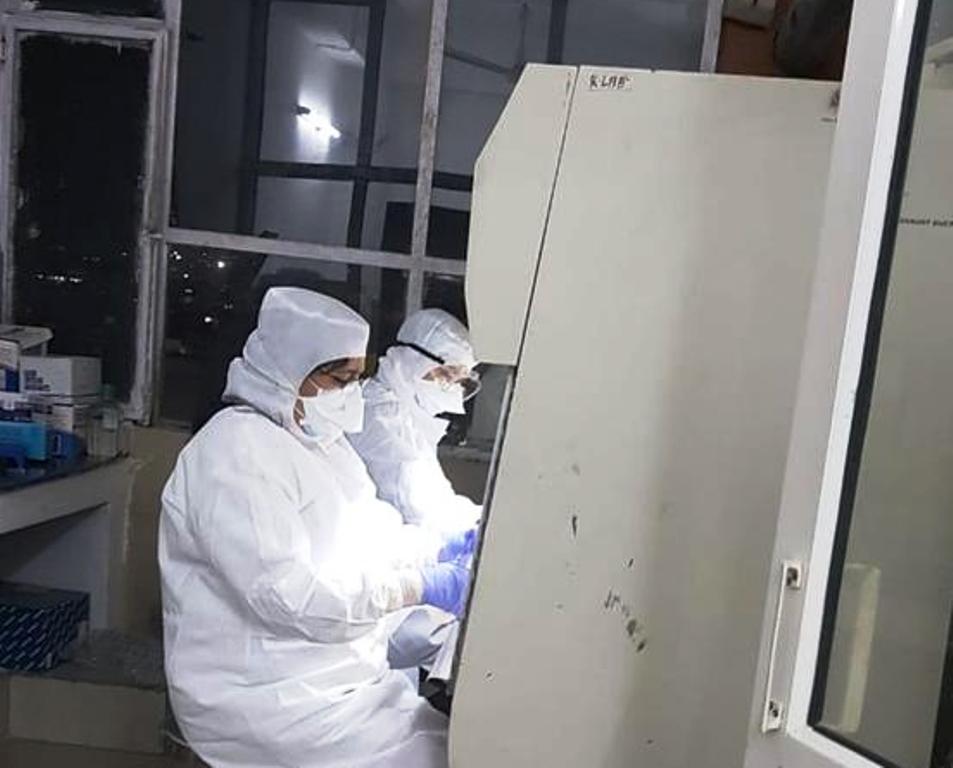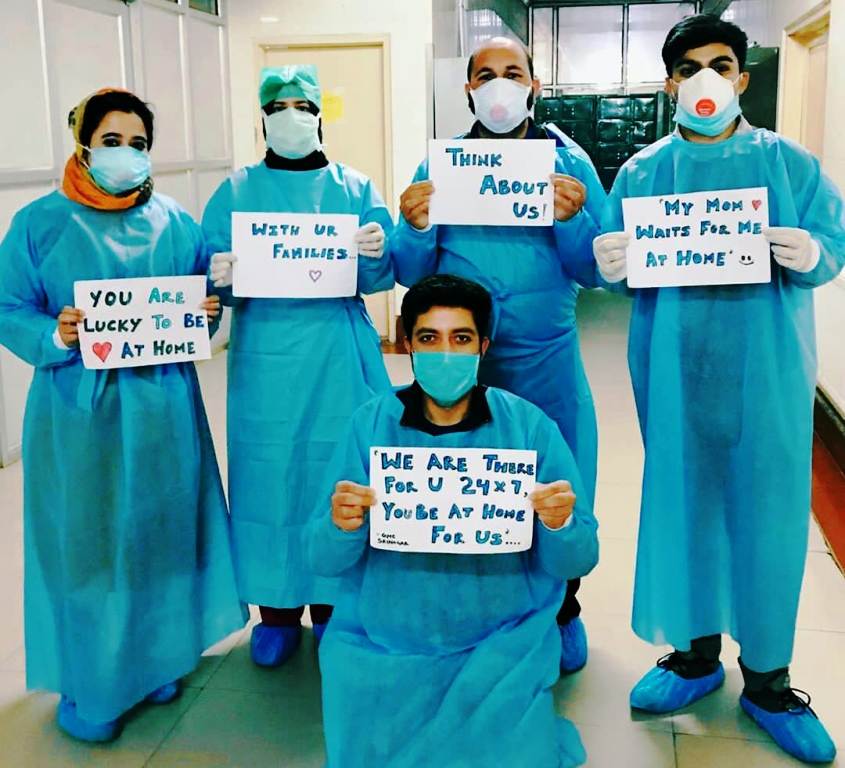As the world scrambles to deal with the Covid-19 pandemic, fear and anxiety have gripped Kashmir too. Saima Bhat reports about how people have started coping with the new crisis that could be lethal.

Entry to private hospitals like Khyber Medical Institute is subject to a welcome temperature check KL Image by Bilal Bahadur
After getting married in 2011, Shehla and Junaid had no child for eight years. Struggling with fertility issues, the couple faced a possibility that they may never have a child. But in June 2019 Shehla broke the incredible news to her husband that she was expecting. The news brought joy to their families too.
The date of delivery fell on March 23 when Kashmir was in the midst of the Coronavirus crisis. Shehla was taken to a private hospital in Srinagar. Concerned over the emerging pandemic, the couple decided against anybody else along. With their aged parents at home, they managed to reach hospital amid strict restrictions in place.
Doctors did not wait and decided to go for the caesarean. The couple had their own anxieties, the absence of family increased it manifolds.
A few hours later, Junaid was alone to see Shehla goes inside the operation theatre (OT). Virtually connected to his family and in-laws, Junaid had a tough time waiting alone outside.
As the support staff came out breaking news that he has fathered a boy, Junaid’s joy knew no bounds. He gave a joyful scream and cried. With nobody around, he felt the loneliness. After handing over clothes for the newborn, he called his father. The rest was expressed in tears.
Junaid later took care of the wife and the child for the following three days. With non-availability of sweets around, the couple shared a candy to celebrate their joy.
“We didn’t have a normal pregnancy. This day came after nine years, so we preferred not to involve even our families,” Junaid said. “I got my wife and child to my home rather than allowing them to go to my in-law’s place.”
The 36-year-old Shehnaz had her third child at the city’s government maternity hospital.
“After watching videos and reading about coronavirus, I was not able to decide whether I should go to a private hospital, which usually is less equipped, or to a government hospital. The virus scare was present at both the places and I was not feeling like going anywhere,” Shehnaz said.
On March 25, however, the same evening when four more patients were declared Covid-19 positive in Kashmir, Shehnaz went into labour. She was rushed to Lal Ded hospital where she delivered a baby boy.

A deserted view during a lock-down in Srinagar on March 31, 2020. Though the people are voluntarily staying indoors, the ubiquitous cops and paramilitary men ensure restrictions. KL Image: Bilal Bahadur.
“The boy’s birth after two daughters is a festivity in Kashmir,” said Shazia, Shehnaz’s only sister-in-law. “But we were worried about how to save the mother and her newborn. And most importantly how to stop relatives from coming to the hospital.”
“We told relatives that they should avoid visiting for their safety. Thankfully barring few, everyone congratulated us over the phone only”.
As the world scrambles to deal with the Coronavirus pandemic, fear and anxiety have gripped Kashmir too. On March 16, when a 65-year-old lady from the old city’s Khayam area was declared as the first positive case it immediately changed the situation in Srinagar and later in other districts.
The lady, now recovering, had returned from Saudi Arabia after performing Umrah along with her husband. Now two more from the same batch, she travelled with, have tested positive. A number of their families are in various quarantine facilities under observation.
In Kashmir, the curbs on movement have triggered a sense of deja vu. It seems again like 2008, 2010, and 2016, but this time without visible bloodshed.
“It looked like the continuation of post-August 5, 2019 scenario, that was dominated by scare, panic and silence,” a Srinagar resident told Kashmir Life.
With concertina wires sealing all the entry and exit points, the deployment of forces in strength has restricted both the pedestrian and vehicular movement. “When I woke up in the morning and peeped through the window, it was a different scene,” said Mehvish, a resident of downtown Srinagar.
Coronavirus pandemic is a world-shattering event. The deadly virus has devastated the lives, destroyed businesses and exposed the incompetence of governments across the globe.
Conscious of the crisis, a middle rung bureaucrat spends his nights in isolation at home. He has even sent his wife and four months old baby to her brother’s home. He prefers to cook and eat alone.
“This is nature’s fury and who knows what will happen. Better not to take chance,” he said, requesting not to be named.
Most of the medical staff that is at the frontline of the fight against the deadly virus is already quarantined. They live far away from their families and follow a strict protocol. This is important right more than 30 medical personnel in Srinagar and Sopore are under quarantine because they had a contact with one positive case who could not survive.
“Initially when I was in Srinagar I used to go home because I was deployed on official work,” one officer said. “Now I am deployed in a periphery where I am taking care of the quarantine and that has forced by to stay isolated. I do not go home because it is not advisable.”
With each passing day, the social fallout of the crisis is becoming clear. When an elderly lady passed away in outskirts of the city on March 22, the scare of Coronavirus inhibited any gathering. Scenes of desperation were witnessed when a woman denied giving wash to the deceased.
Apprehensive about the cause of death, she did not agree to multiple assurances from relatives as well as neighbours that the lady had died of a kidney ailment.
On the contrary, a father who lost daughter in central Kashmir’s Ganderbal district decided not to hold mourning at his place. He went public in his appeal requesting people not to visit his home and instead offer condolences on the telephone.
Shazia Ahad, a banker by profession had a difficult time at her home. Mother of two children, Shazia was told by her in-laws to stop going to the office. Compelled by the job requirements, when Shazia resisted, she along with her kids was sent to her parent’s home.
“I was seen as an untouchable by my mother-in-law. She clearly told me either stop going to the office or live with my parents until this scare is over,” Shazia told Kashmir Life.
As the invisible enemy’s scare is growing every day, 40-year-old Rashida, who was operated upon for her liver carcinoma on August 1, 2019, stops every woman passing by her gate in Barzulla. Wearing a mask and looking shaken, her only query is “if she has more chances of getting this coronavirus. Would she survive given her medical condition?” She spends days reassuring herself of not being hit by the pandemic.
Soon after her surgery in August 2019, Kashmir was under lockdown for more than 200 days but she says her family used to stay with her. “There was no restriction on the visitors, but this lockdown is different,” visibly perturbed Rashida said.
Going against the advice of her family to stay indoors, Rashida moves out as she complains of breathlessness and palpitation within the four walls. “She wants to talk and move around,” said her mother-in-law, Fatima Begum.

Wearing a protective suit, two health officials working in a Coronavirus testing laboratory in J&K. Pic: Twitter
Unlike Rashida, there are many people who have isolated themselves in their homes. “It is pandemic and not like any other flu or outbreak,” said a 34-year old university scholar, Umar. “After going through all the literature available online, I decided self-quarantine is the best thing to save myself and your loved ones.”
Umar is a cancer survivor and doesn’t want to take any risks but at the same time when his parents and siblings move out of their house, he is angry. “This is pure carelessness.” He adds despite his family being educated, the behaviour has been disappointing.
The sense of responsibility, Umar says, is missing in Kashmir. “No doubt we have degrees and flaunt our fluency in English while wearing branded clothes and driving expensive cars, we prove ourselves to be a failure at societal level”.
Narrating her experience at Srinagar airport, Dr Rumisa says people returning from outside use their influence to skip mandatory screening. Despite clear advisories, even students pursuing medicine outside did not bother to stop for the check-up, she laments. “Imagine even the country’s elite AMU PhD scholars ran away from quarantine facilities. What can we expect from layman?”
Presently posted at the district hospital Budgam, she says she was stopped at least at six places on way to her duty. “I am thankful to JK police, who are doing a tremendous job by not allowing people to come out on roads. We as a society are not willing to cooperate without being forced to do so.”
With one case of death and others recovering in the hospital, the number of cases as this report is being filed has reached 21 in Kashmir alone.
However, the surging numbers have no social support, claim experts. Lamenting the stigmatization of diseases in this part of the globe, psychiatrist Dr Arshid Hussain wrote a detailed post on his social handout reading, “The kind of public reaction around people suspected of or infected with coronavirus is depressing,” he said. “We should work together and defeat the pandemic, not stigmatize people who happen to be infected“.
Terming it as a war-like situation, doctors say people have survival anxiety. “Kashmiris are better placed this time because they are able to speak to their dear ones,” Dr Majid, another psychiatrist says.
Working overtime using social media, Dr Majid said that in a day he checked 40 prescriptions on his WhatsApp and gave around 100 consultation calls.
He advises people not to read 24×7 only about the Covid-19. “It should be limited surfing, maybe two hours in the morning and two in the evening and we should not only surf about this virus,” he said adding people should avoid visiting hospitals. “In such a situation people should consult a doctor on the phone only as we have all provided our contacts on Internet”.

A group of Kashmiri doctors suggesting people to help them in fighting the virus by staying home.
Dr Shahida, a junior resident in SKIMS medical college is having a tough time after reaching home these days. As the college has been designated as a Covid-19 centre, she says once she is back, she first takes a bath, bins her clothes in the washing machine and then shifts to her home. “This is precaution, not only for me but for my family, who are at high risk because of diabetes and hypertension,” she said.
Requesting people to stay home, Srinagar’s district magistrate Dr Shahid Iqbal Choudhary continues his campaign to restrict people in their homes. At times, the administration resorts to strict measures. On Thursday evening, Dr Shahid’s spouse too had her piece of advice urging people to remain inside. “My husband “@listenshahid spends almost 18hrs/day chasing covid crisis, he moved to guest house days ago. Ask me what it means when he says BreakThe Chain. Let’s help each other by staying away,” she tweeted.
from Kashmir Life https://ift.tt/2UwVr3O
via IFTTThttps://kashmirlife.net
No comments:
Post a Comment